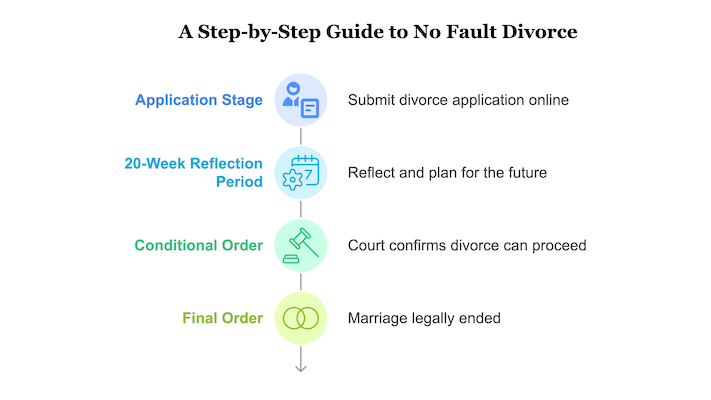For many couples in the UK, the introduction of no fault divorce has made separation a much quicker and less contentious legal process. But, despite this simplified system, one question still comes up over and over again: how long does no fault divorce take?
The answer is that, while the law removes the need to assign blame, it doesn’t mean you should expect an overnight resolution. Divorce in England and Wales takes a minimum of 26 to 30 weeks from start to finish — and that’s in cases when everything runs completely to plan.
Here, we break down exactly how long no fault divorce takes, the best ways to avoid long delays, and how you can keep everything on track throughout the process.
The Legal Timeline at a Glance
Anyone wondering how long no fault divorce takes in the UK should know that timelines vary according to the complexity of your situation. As is often the case in family law, no two relationships are the same. Even so, all separations follow a fixed timeline that is designed to give both parties time to reflect and make practical arrangements.
Here’s how the legal process breaks down:
- 20 Weeks: From the start of the application to the earliest date you can apply for the Conditional Order.
- Six Weeks + One Day: After the Conditional Order is granted, you can apply for the Final Order.
That gives you a minimum timeline of 26 weeks — or just over six months — from the date your divorce application is issued to the point it’s legally finalised.
A Step-by-Step Breakdown of the No Fault Divorce Process
Anyone wondering how long no fault divorce takes should understand the main stages in the process in order to prepare and avoid unwelcome delays. From the point of application, you will work through two separate reflection periods as you progress from the Conditional Order to the Final Order. Once issued, your divorce will be complete.
Here’s what you can expect:
1. Application Stage
You can make an application for a divorce either solely or jointly. If you’re both able to cooperate — and are keen to keep costs down — you could use the same family lawyer and apply together if there are no contentious issues between you. Applications are now made online in most cases, and you’ll need to provide:
- Your marriage certificate.
- Personal details for both parties.
- Payment of the divorce fee (£593 as of 2025).
Once submitted and accepted by the court, the divorce process officially begins.
2. 20-Week Reflection Period
This is a mandatory waiting period before you can move to the next stage. It’s designed to give both parties time to reflect, plan for the future, and — if necessary — start to discuss shared finances and/or child arrangements. If you find it difficult to negotiate terms with your former spouse, your solicitor may encourage you to try mediation.
You can use this time to:
- Agree on how to divide finances.
- Discuss parenting plans.
- Begin mediation (if necessary).
3. Conditional Order
After the 20-week reflection period, you can apply for a Conditional Order (previously known as the Decree Nisi). This is a court’s confirmation that it sees no reason the divorce can’t proceed.
If your paperwork is in order, the Conditional Order is usually granted within a few weeks.
4. Final Order
For those asking, “How long does no fault divorce take?”, the final stage is the Final Order. You will need to wait at least six weeks and one day after the Conditional Order is granted before you can apply. However, once it is issued, your marriage is legally ended.

What Can Affect How Long a No Fault Divorce Takes?
How long a no fault divorce takes could depend on a few factors. These range from disputes over finances and childcare, to unexpected backlogs in court. If all the necessary documentation is completed accurately and on time, the separation could be finalised at the 26-week mark, which is the earliest possible time for the process to be completed.
However, it could take longer than this if there are:
- Missed Deadlines or Administrative Errors: Mistakes in your application — such as spelling errors, incorrect dates, or missing information — will need to be addressed, significantly delaying proceedings.
- Delayed Responses: Even in joint applications, both parties tend to sign off at different stages. If one party takes their time to respond, this could prolong the process.
- Financial and/or Childcare Disputes: Many couples wait to finalise the divorce until future finances or child arrangements have been resolved. Because these are such emotive subjects, it’s not uncommon for negotiations to take their time — especially when there is acrimony, or high value assets are at stake.
- Switching Application Type: Switching from a joint to a sole application (or vice versa) adds extra admin time, as the court will need to process the change.
- Court Backlogs: While the courts aim to process divorces promptly, demand can fluctuate. Local court workloads might delay the Conditional or Final Order being granted, especially during peak periods like summer or the new year.
How Can I Speed Up My Divorce?
If you’re wondering how to speed up a no fault divorce, the short answer is: there’s no way to reduce the mandatory 20-week and six-week waiting periods. However, you can make the process more efficient if you cooperate with your ex-partner, complete the application with care, and — most importantly — find the right solicitor to handle the process for you.
You can keep timescales to an absolute minimum by:
- Filing online through Gov.uk for faster processing.
- Double-checking all paperwork before submission.
- Responding quickly to any court communications.
- Working collaboratively with your ex-partner (where possible).
- Seeking an experienced solicitor. They will manage the process and handle any complexities on your behalf.
While the waiting periods can feel frustrating, they’re also a valuable opportunity to lay important groundwork; such as sorting financial disclosure documents, starting mediation, drafting a parenting agreement, and organising your post-divorce housing and finances.
Taking these steps proactively can help ensure you’re prepared, settled, and ready to move forward once the Final Order is granted.
Make Divorce Easier with Lowry Legal
No fault divorce may have removed the need to assign blame at the end of a relationship — but the process still requires careful planning, cooperation, and attention to detail. Knowing the timeline, and what might delay it, could manage your expectations and help you to avoid unnecessary setbacks.
At Lowry Legal, we specialise in guiding high net worth clients through divorce with clarity, confidence, and compassion. Whether you’re navigating complex financial matters or simply want to avoid costly delays, our expert family law team is here to make the process as smooth and efficient as possible. We’ll handle the complex legal side, so you can focus on what comes next.
Get in touch today to find out how we can help you move forward with certainty.
Request a Callback
Leave a few details below and one of our team will be in touch to discuss how we can support you with your legal needs. Please note that we cannot offer Legal aid.














